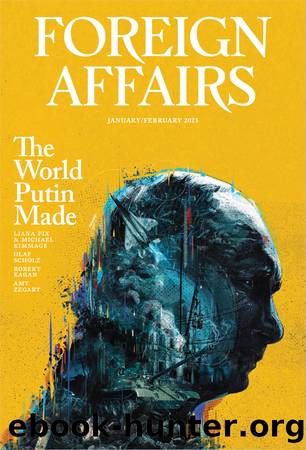The World Putin Made by unknow

Author:unknow
Language: eng
Format: epub
Publisher: Council on Foreign Relations
Published: 2022-12-13T00:00:00+00:00
MENDING FENCES
For those who believe that U.S. foreign policy should privilege human rights and shun fossil fuels, the fraying U.S.-Saudi relationship poses no problem. But even the Biden administration, which entered office happy to distance itself from Riyadh, quickly came around to the need for a working relationship with the worldâs largest oil exporter. No matter how committed the United States is to adopting clean energy, oil will be needed during the transition. No matter how badly Americans want to pivot away from the Middle East, Washington has geopolitical commitments in the region that draw the United States back in: keeping Iran from obtaining nuclear weapons, preventing a resurgence of jihadism, maintaining regional stability to reduce refugee pressures on Europe, and sustaining the relationship with Israel. If oil and the Middle East remain even marginally important for U.S. interests, a working relationship with Saudi Arabia is necessary.
Step one in sustaining such a relationship is to recognize how it has changed. The days when Saudi Arabia would automatically side with the United States on grand strategic issues are gone; for the Saudis, China and Russia now loom larger than ever. That does not mean that Riyadh will work against the United States at the global level. It just means that the Saudis will consider issues case by case. That will require the United States to take an open and consultative approach, maintaining channels of communication to convince the Saudis of common interests on global issues. Keeping Riyadh at armâs length is not the way to keep it on Washingtonâs side.
On the big issues in the Middle East, Washington and Riyadh are not that far apart. The traditional stumbling block, the close U.S.-Israeli relationship, is no longer an obstacle, thanks to warming Saudi-Israeli relations. The Saudis are increasingly willing to work with Israel, even if they are not yet ready to follow Bahrain, Morocco, Sudan, and the United Arab Emirates into the so-called Abraham Accords, through which those countries have normalized their relations with Israel.
Another point of tension with Riyadh that suddenly seems less salient is Washingtonâs effort to curtail Iranâs nuclear activities through diplomacy, which the Saudis worried would entail concessions to Iran that would solidify Tehranâs regional influence. It seems likely that efforts to revive the Iran nuclear deal, which Trump pulled out of in 2018, will fail. Washington will inevitably have to find a new policy to deter or prevent Iran from obtaining nuclear weapons while also limiting or rolling back Iranian influence in the region. Saudi Arabia has the same interest.
Although terrorism is not at the top of the agenda today, the United States still has an interest in preventing a resurgence of Salafi jihadism, extremism fueled by a revolutionary and violent interpretation of Islam, as represented by al Qaeda, the Islamic State (also known as ISIS), and other groups. Under MBS, Saudi Arabia has not only opposed those groups in the region but has also reduced the influence of the Salafi religious establishment in the kingdom. When
Download
This site does not store any files on its server. We only index and link to content provided by other sites. Please contact the content providers to delete copyright contents if any and email us, we'll remove relevant links or contents immediately.
| Anarchism | Communism & Socialism |
| Conservatism & Liberalism | Democracy |
| Fascism | Libertarianism |
| Nationalism | Radicalism |
| Utopian |
The Secret History by Donna Tartt(16661)
The Social Justice Warrior Handbook by Lisa De Pasquale(11494)
Thirteen Reasons Why by Jay Asher(7801)
This Is How You Lose Her by Junot Diaz(5799)
Weapons of Math Destruction by Cathy O'Neil(5046)
Zero to One by Peter Thiel(4834)
The Myth of the Strong Leader by Archie Brown(4795)
Promise Me, Dad by Joe Biden(4455)
Beartown by Fredrik Backman(4433)
Stone's Rules by Roger Stone(4422)
How Democracies Die by Steven Levitsky & Daniel Ziblatt(4414)
The Fire Next Time by James Baldwin(4350)
100 Deadly Skills by Clint Emerson(4085)
A Higher Loyalty: Truth, Lies, and Leadership by James Comey(4039)
Rise and Kill First by Ronen Bergman(4020)
The David Icke Guide to the Global Conspiracy (and how to end it) by David Icke(3891)
The Farm by Tom Rob Smith(3878)
Secrecy World by Jake Bernstein(3788)
The Doomsday Machine by Daniel Ellsberg(3737)
